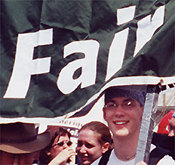|
Quebec Communique
By John Byrne Barry
"The wall said to me: 'People out, corporations in.' "
Sierra Student Coalition Director Camilla Feibelman was back in her Providence, R.I., office after a weekend in Quebec City. She was talking about the two-mile-long wall of concrete and chain-link fence that surrounded the Summit of the Americas site and kept the tens of thousands of protest-ors at bay.
 Behind those walls, trade ministers from Canada to Chile were talking about tearing down barriers - like environmental standards - and making it easier for goods and services to move freely within what would become the world's largest trading bloc, encompassing 34 nations and 800 million people. Behind those walls, trade ministers from Canada to Chile were talking about tearing down barriers - like environmental standards - and making it easier for goods and services to move freely within what would become the world's largest trading bloc, encompassing 34 nations and 800 million people.
Walls, fences, barriers - those were the defining metaphors for Feibelman, who went to Quebec with two dozen other Sierra Club and SSC members to voice opposition to the proposed Free Trade Area of the Americas (FTAA) treaty.
"It was so frustrating to see how many barriers there were - the physical ones, like the fence between the protestors and the trade ministers, the police in their plastic shields and gas masks, the border guards who searched all my luggage and checked all my computer disks. And then there were the communications barriers, like the way protestors were simplistically portrayed as ill informed."
But Feibelman and her colleagues were anything but ill informed.
Around the perimeter, they stood up on milk crates and belted out impromptu speeches blasting President Bush's trade agenda.
"At one point, a march was ending just as I got up to speak," said Feibelman.
"Someone handed me a megaphone and all of a sudden I was talking to thousands of people.
"We're not against trade," she said. "We are opposed to an agreement that gives trade priority over nations' environmental and labor standards. We went to Quebec partly to practice communicating that distinction, and there's nothing like a TV camera in your face to make you practice."
Ben Gore, a freshman at Middlebury College in Vermont and coordinator of the SSC's globalization work, was hoarse by the end of the weekend - from giving speeches and inhaling tear gas.
"I was on the debate team in high school, but it's rare to get an opportunity to give a loud, full-throated speech," he said.
The Club contingent also participated in the largest march of the weekend, organized by Canadian labor groups.
While the media focused on the minority of protestors who were violent, much of the coverage was nuanced and gave weight to the protestors' concerns - and nonviolent tactics. The Washington Post's Paul Blustein wrote, "The protesters and their sympathizers, especially in the labor and environmental movements, are forcing the powers that be to confront some of the issues they are raising and change a number of the system's rules."
Sierra Club President Robbie Cox believes the protest and news coverage helped increase awareness of the dark side of free trade and will help mobilize opposition.
"After Quebec, millions know that the proposed treaty imperils safeguards for the environment and working people," he said.
What comes next for U.S. activists is the fight over fast-track authority, in which Congress is restricted to an up or down vote on trade deals negotiated by the president.
"We're going to stop fast track cold," said Gore. "But it will be a different kind of fight; the SSC will be concentrating on influencing public opinion in 20 key congressional districts."
On Sunday, Earth Day, hundreds of protestors participated in a cleanup of the streets organized by the Sierra Club of Canada. "We filled our plastic bags with litter, tear gas canisters, rubber bullets, bottles and placards," said Brooke Priest, one of the SSC members who went to Quebec. "Of course, we separated out the recyclables."
"We left the city cleaner than we found it," said Feibelman. "We wanted to send a message to clean up dirty trade."
Take Action: Urge your representative to oppose fast track policies that would expand NAFTA. Urge support of a "right track" trade policy that ensures environmental laws won't be undercut, uses the lever of trade to improve environmental protections and ensures normal democratic procedures.
To join the fight to make trade clean, green and fair, contact dan.seligman@sierraclub.org or nayythan@hotmail.com.
Up to Top
|